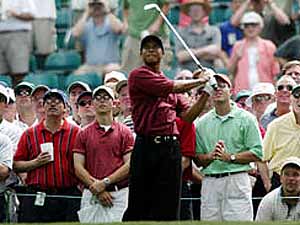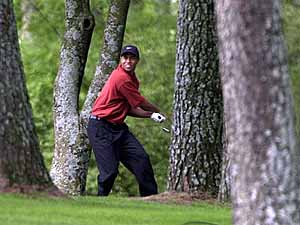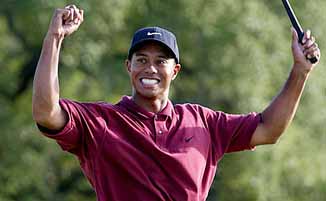By Mike Friedman, Special Contributor to GolfTheMidAtlantic.com
Photos by PGATour.com
While covering this year's incredibly exciting PGA Championship, CBS offered an interesting statistic tucked in between Rich Beem's 'everyman' victory and Tiger Woods' near storm-from-behind comeback try. It showed that in major championships where Tiger Woods entered the final round holding or tied for the lead, his record is 8 wins in 8 tries. He's undefeated when heading into Sunday with at least a share of the lead.
The more interesting part of the stat, however, was that Tiger was 0-15 in majors where he trailed going into the last day. This probably comes as a surprise to many, especially those who subscribe to the theory that other golfers simply fold up and disappear when Tiger is "lurking." By the way, notwithstanding Tiger's impressive finish of consecutive birdies on holes 15-18 at Hazeltine during the final round of the PGA, his record now stands at 0-16 where he's had to make up ground in majors.
 |
In those 16 majors Tiger didn't win, there've only been a few where he was so far out of it going into the final round that intimidation wouldn't be a factor. Players have grown accustomed to Tiger's miracle comebacks, so the "intimidation factor" would be the same for majors as it would for regular tour events ... you'd think.
Since he has made some impressive comebacks in non-majors, including one in which he made up seven strokes on the final seven holes to win (at Pebble Beach in the AT&T), one wonders why he hasn't staged a similar rally in a major.
Here are my thoughts:
 |
The primary reason is that in most major tournaments, it's generally a low percentage strategy to play aggressively and shoot directly at pins. The penalties are usually too severe for a poor shot, which is why par is often a good score in a major. The Masters might be an exception -- due to its less severe rough, but even Augusta offers its own series of obstacles for those who play too aggressively without pinpoint accuracy.
Tiger knows the formula for 'major' success: get the lead going into Sunday, and shoot pars all day with an occasional birdie when the course allows an opening (it also should be noted that Tiger's length often allows him to chew up par fives, where most others can't). He thus forces the other contenders to try the aggressive play, often with tragic results. It's not that the other players are "intimidated," they simply feel the need to play aggressively to catch up -- and on "major" courses, that often puts them further behind, allowing Tiger to play conservatively.
When Tiger is not leading, however, he can't employ the conservative strategy. He's then forced to take a few chances of his own, while a different leader can play the conservative game.
 |
Not everyone can shoot consistent pars on Sunday of a major like Tiger does, as demonstrated by Justin Leonard's collapse at the PGA. But, when Tiger has to play catch up along with most of the others, he hasn't had any more success than his challengers have. He is simply far better with a lead than anyone else, and that is partly due to Tiger's almost never making a mental mistake. When he hits an errant shot, it's invariably a physical, swing-related mistake, not poor club selection or strategy.
Moreover, Tiger almost never allows his nerves to get the best of him. Major tournaments impose pressures that some players have trouble dealing with, whether Tiger is in contention or not. Tiger seems to thrive on that pressure, and kicks his game up a notch in such situations (such as birdieing the final four holes at Hazeltine). But, he usually doesn't wait until the final round to do so. Playing catch up in a major is an art that even Tiger has failed to master.
Interestingly, the recent PGA was Tiger's first 2nd place finish in a major. Jack Nicklaus had 23 such finishes to go along with his 18 major wins. One would expect that if all the other golfers are trembling with fear when Tiger is on the leader board, he should come in 2nd quite often when he isn't winning. Not the case. When Tiger isn't leading or tied for the lead when he wakes up on a Sunday morning in a major, he doesn't tend to threaten.
Much is made of the "intimidation factor" supposedly allowing Tiger to roll to wins because no one can stand up to him. But the evidence doesn't support that theory. What the statistics show is that Tiger is the best golfer in the world by a significant margin, and that his skill advantage has allowed him to grab the lead going into Sunday in eight majors (in six seasons), and he hasn't given away any of those eight.
 |
When he's not leading, however, he's not scaring those who are ahead of him into folding. When he trails going into Sunday at a major, he does not win (0 for 16). There's no disputing that Tiger is one of the two best, if not the best golfer ever. Apparently, Tiger may also be the best frontrunner ever as well.
But, are the other golfers scared of him? No. They just aren't consistently as good.
Details:
Note: Pictures are from www.pgatour.com.
| Related Links | Comments on this article? | |
|
Maryland National Golf Club Hollow Creek Golf Club Rocky Gap Resort PB Dye Golf Club in Ijamsville Whiskey Creek Golf Club |
E-mail Jeff Rendall, Editor: jrendall@golftheunitedstates.com |












